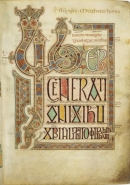| Genesis | Exodus | Leviticus | Numbers | Deuteronomy | Joshua | Judges | Ruth |
| 1 Samuel | 2 Samuel | 1 Kings | 2 Kings | 1 Chronicles | 2 Chronicles | Ezra |
| Nehemiah | Esther | Job | Psalms | Proverbs | Ecclesiastes | Song of Solomon |
| Isaiah | Jeremiah | Lamentations | Ezekiel | Daniel | Hosea | Joel | Amos | Obadiah |
| Jonah | Micah | Nahum | Habakkuk | Zephaniah | Haggai | Zechariah | Malachi |
| Tobit | Judith | Additions to Esther | Wisdom of Solomon | Ecclesiasticus | Baruch |
| Letter of Jeremiah | Prayer of Azariah | Susanna | Bel & the Dragon | 1 Maccabees |
| 2 Maccabees | 1 Esdras | 2 Esdras |
| Matthew | Mark | Luke | John | Acts | Romans | 1 Corinthians | 2 Corinthians |
| Galatians | Ephesians | Philippians | Colossians | 1 Thessalonians | 2 Thessalonians |
| 1 Timothy | 2 Timothy | Titus | Philemon | Hebrews | James | 1 Peter | 2 Peter |
| 1 John | 2 John | 3 John | Jude | Revelation |
 The Book:
The Book:
The Wisdom of Ben Sira, (or The Wisdom of Yeshua Ben Sira or merely Sirach), called Ecclesiasticus by Christians, is a book written circa 180–175 BCE. The author, Yeshua ben Sira, was a Jew who had been living in Jerusalem, who may in fact have established his school and written his work in Alexandria (Guillaume). His work was written in Hebrew, nevertheless, and translated into Greek by his grandson in Egypt, who added a preface.
 Content:
Content:
The Book of Ben Sira is a collection of ethical teachings. Thus Ecclesiasticus closely resembles Proverbs, except that, unlike the latter, it is the work of a single author, not an anthology of maxims drawn from various sources. Some have denied Ben Sira the authorship of the apothegms, and have regarded him as a compiler.
The teachings are applicable to all conditions of life: to parents and children, to husbands and wives, to the young, to masters, to friends, to the rich, and to the poor. Many of them are rules of courtesy and politeness; and a still greater number contain advice and instruction as to the duties of man toward himself and others, especially the poor, as well as toward society and the state, and most of all toward God. These precepts are arranged in verses, which are grouped according to their outward form. The sections are preceded by eulogies of wisdom which serve as introductions and mark the divisions into which the collection falls.
Wisdom, in Ben Sira's view, is synonymous with the fear of God, and sometimes is identified in his mind with adherence to the Mosaic law. The maxims are expressed in exact formulas, and are illustrated by striking images. They show a profound knowledge of the human heart, the disillusionment of experience, a fraternal sympathy with the poor and the oppressed, and an unconquerable distrust of women.
As in Ecclesiastes, two opposing tendencies war in the author: the faith and the morality of olden times, which are stronger than all argument, and an Epicureanism of modern date. Occasionally Ben Sira digresses to attack theories which he considers dangerous; for example, that man has no freedom of will, and that God is indifferent to the actions of mankind and does not reward virtue. Some of the refutations of these views are developed at considerable length.
Through these moralistic chapters runs the prayer of Israel imploring God to gather together his scattered children, to bring to fulfilment the predictions of the Prophets, and to have mercy upon his Temple and his people. The book concludes with a justification of God, whose wisdom and greatness are said to be revealed in all God's works as well as in the history of Israel. These chapters are completed by the author's signature, and are followed by two hymns, the latter apparently a sort of alphabetical acrostic.
Source: Wikipedia, the free encyclopedia © 2001-2006 Wikipedia contributors
(Disclaimer)
This article is licensed under the GNU Free Documentation Licence.
View this article at Wikipedia.org
 Print this page
Print this page